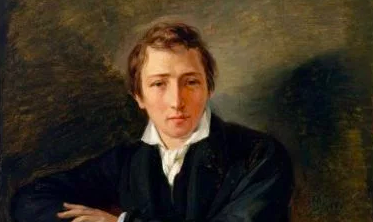Diversity Macht Frei
March 11, 2018
Throughout the 19th century, Jews cultivated the myth of the tolerant Muslims of Spain whose enlightened rule was brought to an end by the brute and barbarous Christians. One of the propagators of this myth was Heinrich Heine, a Jewish poet who underwent a faithless conversion to Christianity in an (unsuccessful) attempt to boost his career.
The National Socialist regime in Germany denounced Heine as a Semitic subversive and burnt his books.
Accordingly, Heine’s dictum that “Where they burn books, they will in the end burn men” is often quoted in connection with Hitler’s regime.
But the context for the quote is rarely given. In fact, it comes from a play – Almansor – whose eponymous lead character is a (fictional) Muslim ruler ousted by the Christian Reconquista.
Here is the relevant passage in which the Muslims discuss what had happened after the fall of Granada to Christian forces. (I haven’t been able to find an English translation of this work, so this translation is my own.)
Almansor: Soon heard we then that even the great Zegri
In cowardly fear of death, embraced the Cross;
That many followed the example of the great one,
And thousands bent their head for baptism.
Hassan: The new heaven attracts many old sinners.
Almansor: We heard that the fearful Ximenez
In the middle of the market, in Granada –
My tongue is rigid in my mouth – threw
The Koran into a burning heap of flames.
Hassan: That is just a prelude, where they burn books
They will also in the end burn men.
So the book being burnt was the Koran. This play was only performed once, in 1823. In fact, the performance was never completed because the audience started booing and jeering and creating a ruckus. Supposedly, the trouble began after the first intermission when someone asked who the author of the play was. On being told it was “The Jew Heine”, the audience was triggered, replying “What? We’re supposed to listen to this nonsense from the silly Jew. We’re not going to tolerate it any more! Let’s thump the play off the stage!”
The Islamophilic discourse of the Jews in the 19th century can generally be regarded as an early example of Jews weaponizing (fake) history to corrode the culture, patriotism and faith of the people they live among. Heine’s Almansor was no different. The play had been written as what we might call a “globalist” polemic in response to an incident in which young German patriots had burnt books and denounced cosmopolitans, Jews and the effects of the French revolution.
On October 17, 1817, during the anniversary celebration of the victory over Napoleon at the battle of Leipzig, German student fraternities had convened in the historic Wartburg castle where Luther had translated the Bible three hundred years earlier. On this occasion, the students burned several “subversive” books, emulating Luther’s public burning of the papal bull. The offending volumes included the French civil code and Saul Ascher’s pamphlet against the “Teutomaniacs.” To the accompaniment of fierce speeches against “foreigners,” “cosmopolitans,” and “Jews,” among others, the books were solemnly thrown into the flames. “Woe to the Jews who hold on to their Jewishness while mocking and reviling our own national character, our Germanness.”
“The Pity of it All: A Portrait of Jews in Germany 1743-1933” by Elon Amos
Heine also evoked the fictional character of Almansor in several poems, always expressing nostalgia for Islamic rule and hostility to Christianity. In the poem “Almansor”, he mournfully contemplates the re-conversion of the Cordoba mosque into a Christian place of worship.
On the steps whereon the faithful
Used to sing the Prophet’s sayings,
Now baldpated priests exhibit
All the mass’s trivial wonders.How they twirl before the colour’d
Puppets, full of antic capers,
Midst the incense smoke and ringing,
While the senseless tapers sparkle!
This poem could also be regarded as an early example of Jewish race-mixing propaganda. It describes Almansor going to a Christian castle and romancing the ladies there while pretending to be a Christian.
He in turns assures each lady
That he heartily adores her;
“On the true faith of a Christian”
Swears he thirty times that evening.
As he makes love to one of the women, he dreams of violent revenge upon the Christians.
From her light eyes tears in torrents
Weeps the lady, sadly musing,
On Almansor’s dark-brown tresses, —
And his lips begin to quiver.And he dreams he’s once more standing
With his head bent down and weeping
In fair Cordova’s cathedral,
Many gloomy voices hearing.All the lofty giant-columns
Hears he murmuring full of anger, —
That no longer will they bear it,
And they totter and they tremble.And they wildly fall together,
Pale turn all the priests and people,
Crashing falls the dome upon them,
And the Christian gods wail loudly.
Years ago, before I was JWoke, I read Heine’s poem “The Silesian Weavers”. I remember being struck by the strangeness of a poet expressing such intense hostility to his “own” country. Knowing what I know now, of course, it becomes much more comprehensible.
No tears from their gloomy eyes are flowing,
They sit at the loom, their white teeth showing:
“Thy shroud, O Germany, now weave we,
“A threefold curse we’re weaving for thee, —
“We’re weaving, we’re weaving!

